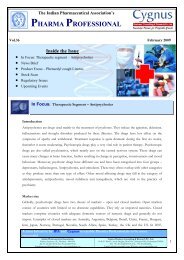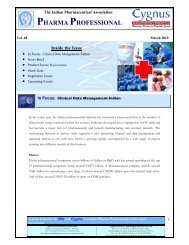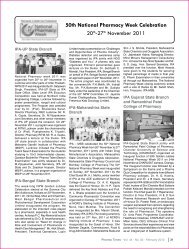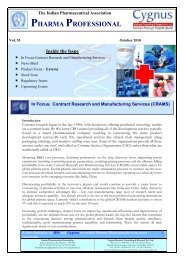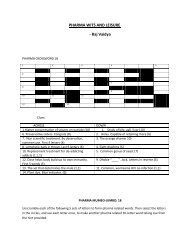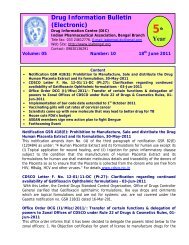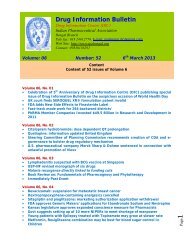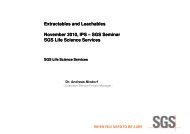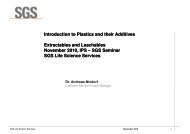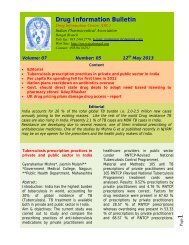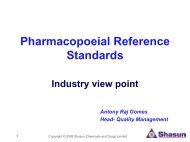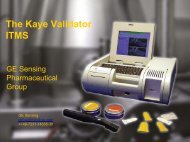WHO Prequalification of Medicines Programme - Indian ...
WHO Prequalification of Medicines Programme - Indian ...
WHO Prequalification of Medicines Programme - Indian ...
Create successful ePaper yourself
Turn your PDF publications into a flip-book with our unique Google optimized e-Paper software.
<strong>WHO</strong> <strong>Prequalification</strong> <strong>of</strong><br />
<strong>Medicines</strong> <strong>Programme</strong><br />
General overview and update<br />
Milan Smid, M.D., Ph.D.<br />
Slides benefiting from presentations <strong>of</strong> <strong>WHO</strong> PQP colleagues and BioBridge Strategies<br />
<strong>WHO</strong> PQP tutorial, 27 th September, 2012, Mumbai
UN <strong>Prequalification</strong> <strong>Programme</strong><br />
for Priority Essential <strong>Medicines</strong><br />
Action plan <strong>of</strong> UN from 2001 for expanding<br />
access to selected priority medicines<br />
Objective:<br />
• To ensure quality, efficacy and safety <strong>of</strong> medicines<br />
procured using international funds (e.g. GFTAM,<br />
UNITAID) to serve patients in developing countries<br />
Components:<br />
• Evaluation <strong>of</strong> Quality, Safety and Efficacy <strong>of</strong> prioritised Essential<br />
medicines (FPPs and APIs), inspections <strong>of</strong> manufacturers and<br />
monitoring <strong>of</strong> the products after their prequalification.<br />
• <strong>Prequalification</strong> <strong>of</strong> quality control laboratories.<br />
• Building capacity <strong>of</strong> regulators, manufacturers and quality control<br />
laboratories.<br />
2<br />
PQP update<br />
Mumbai, 27 Sept, 2012<br />
2
Categories <strong>of</strong> medicines invited<br />
• Primary categories <strong>of</strong> medicines:<br />
– HIV/AIDS<br />
– Malaria<br />
– Tuberculosis<br />
• Later added:<br />
– Reproductive health<br />
– Influenza<br />
– Acute diarrhoea<br />
– Neglected tropical diseases<br />
• Potentially other categories <strong>of</strong> products, if there is the need<br />
• <strong>Prequalification</strong> also applicable for APIs!<br />
• Published in invitations for Expression <strong>of</strong> Interest<br />
(EOI) on <strong>Prequalification</strong> website<br />
3<br />
PQP update<br />
Mumbai, 27 Sept, 2012<br />
3
5 th Invitation for EOI, May 2010<br />
Reproductive health medicines (1)<br />
PQP update<br />
Mumbai, 27 Sept, 2012<br />
4
3 rd Invitation for EOI<br />
Active Pharmaceutical Ingredients<br />
Therapeutic area<br />
HIV/AIDS<br />
Malaria<br />
Tuberculosis<br />
Invited Active Pharmaceutical Ingredients<br />
Abacavir, Atazanavir, Darunavir, Didanosine, Efavirenz, Emtricitabine,<br />
Etravirine, Lamivudine, Lopinavir, Nelfinavir, Nevirapine, Raltegravir,<br />
Ritonavir, Stavudine, Ten<strong>of</strong>ovir, Zidovudine<br />
Amodiaquine, Artemether, Artesunate, Dihydroartemisinin,<br />
Lumefantrine, Mefloquine, Piperaquine, Pyrimethamine, Pyronaridine,<br />
Sulfadoxine<br />
Amikacin, Capreomycin, Cycloserine, Ethambutol, Ethionamide,<br />
Isoniazid, Kanamycin, Lev<strong>of</strong>loxacin, Moxifloxacin, Ofloxacin, Para-<br />
Aminosalicylic Acid (PAS), Prothionamide, Pyrazinamide, Rifampicin,<br />
Streptomycin, Terizidone<br />
Reproductive<br />
health<br />
Neglected tropical<br />
diseases<br />
Desogestrel, Estradiol, Ethinylestradiol, Etonogestrel, Levonorgestrel,<br />
Medroxyprogesterone, Mifepristone, Misoprostol, Norethisterone,<br />
Norgestrel, Oxytocin<br />
Diethylcarbamazine, Mebendazole<br />
PQP update<br />
Mumbai, 27 Sept, 2012<br />
5
Two prequalification routes<br />
Invitation for<br />
expression <strong>of</strong> Interest<br />
Expression <strong>of</strong> Interest<br />
Medicine not<br />
assessed by SRA<br />
Medicine assessed<br />
by SRA<br />
Dossier and SMF<br />
submitted for assessment<br />
<strong>WHO</strong> assessment<br />
and inspections<br />
organized<br />
Valid for innovators and generics<br />
SRA registration<br />
(assessment and<br />
compliance check)<br />
Simplified review<br />
Compliance <strong>Prequalification</strong> Acceptance<br />
6<br />
PQP update<br />
Mumbai, 27 Sept, 2012<br />
6
Essential steps <strong>of</strong> PQ evaluation procedure<br />
• Need is specified and agreed by <strong>WHO</strong> treatment programmes<br />
• Invitation for Expression <strong>of</strong> Interest (EOI) is published<br />
• Interested parties submit dossiers – 'Expression <strong>of</strong> interest'<br />
• Dossiers receive initial screening<br />
• Full dossiers are assessed<br />
• Inspections are conducted at manufacturing sites and at CROs<br />
• Samples are tested, if needed<br />
• If outcome is positive, pharmaceutical product is listed on the<br />
website, including product information (SPC, PIL),<br />
assessment report (<strong>WHO</strong>PAR) and inspection report<br />
(<strong>WHO</strong>PIR)<br />
7<br />
PQP update<br />
Mumbai, 27 Sept, 2012<br />
7
Steps in <strong>WHO</strong> prequalification<br />
I<br />
Expression<br />
<strong>of</strong> Interest<br />
Assessment<br />
Additional information<br />
and data<br />
Compliance<br />
Product dossier<br />
SMF<br />
<strong>Prequalification</strong><br />
Inspections<br />
Corrective<br />
actions<br />
Compliance<br />
Maintenance and monitoring<br />
8<br />
PQP update<br />
Mumbai, 27 Sept, 2012<br />
8
Essential steps <strong>of</strong> monitoring <strong>of</strong> PQ product<br />
• Variations to the dossier <strong>of</strong> prequalified product<br />
• Sampling and Testing<br />
• Re-inspections<br />
• Requalification<br />
• Management <strong>of</strong> complaints<br />
• De-listing or suspension (if and when appropriate)<br />
9<br />
PQP update<br />
Mumbai, 27 Sept, 2012<br />
9
Principles<br />
• Same principles apply as for national regulatory<br />
approvals by stringent authorities<br />
– Data on quality (FPP, API)<br />
– Data on efficacy and safety or interchangeability<br />
– Compliance with GMP (FPP, API), GCP/GLP<br />
(bioequivalence studies)<br />
– Benefits prevail risks<br />
PQP update<br />
Mumbai, 27 Sept, 2012<br />
10
Assessment <strong>of</strong> product dossiers<br />
• One week meeting at least every 2 months, team <strong>of</strong><br />
pr<strong>of</strong>essionals from NMRAs<br />
– Botswana, Canada, China, Congo, Ethiopia, France, Georgia, Germany,<br />
Ghana, Israel, Italy, Kenya, Malaysia, Netherlands, New Zealand, Portugal,<br />
Singapore, Spain, South Africa, Sweden, Switzerland, Tanzania, Uganda, UK,<br />
Zambia, Zimbabwe ...<br />
• Combined with capacity building<br />
• Quality assurance <strong>of</strong> outcomes<br />
PQP update<br />
Mumbai, 27 Sept, 2012<br />
11
Inspections<br />
• Team <strong>of</strong> inspectors for each inspection<br />
• <strong>WHO</strong> PQ inspector plus PIC/S member country plus local<br />
country inspector (observer)<br />
• Some cases – capacity building (recipient country)<br />
• Preparation includes SMF, product information,<br />
inspection reports, complaints etc<br />
• Inspections are product oriented and include data<br />
verification<br />
• APIs and Bioequivalence studies inspected based on risk<br />
assessment<br />
1<br />
PQP update<br />
Mumbai, 27 Sept, 2012<br />
12
Standards<br />
• <strong>WHO</strong> standards as defined in <strong>WHO</strong> guidelines are applied in<br />
prequalification process<br />
• If these not exist, ICH guidelines are applied<br />
• In case <strong>of</strong> need, guidelines <strong>of</strong> stringent regulatory authorities<br />
involved in ICH process<br />
• Pharmacopoeias (Ph.Int., USP, BP, Ph.Eur., JP) as minimum<br />
standard<br />
– Depending on product, assessors may ask for additional tests or<br />
tightening limits<br />
• <strong>WHO</strong> GMP guidelines (compatible with PIC/S; references to<br />
pharmacopoeias, e.g. harmonized monographs)<br />
• <strong>WHO</strong> GCP guidelines + Additional guidance for organizations<br />
performing in vivo bioequivalence studies (compatible with ICH)<br />
1<br />
PQP update<br />
Mumbai, 27 Sept, 2012<br />
13
Adapting the CTD-NDS (new drug)<br />
to CTD-ANDS (generic)<br />
Regional<br />
Admin<br />
Information<br />
Module 1<br />
Not Part <strong>of</strong><br />
the CTD<br />
Module 2<br />
Quality<br />
Overall<br />
Summary<br />
Nonclinical<br />
Overview<br />
Nonclinical<br />
Summary<br />
Clinical<br />
Overview<br />
Clinical<br />
Summary<br />
The CTD<br />
Quality<br />
Nonclinical<br />
Study Reports<br />
Clinical<br />
Study Reports<br />
Module 3 Module 4 Module 5<br />
PQP update<br />
Mumbai, 27 Sept, 2012<br />
14
Demonstration <strong>of</strong> bioequivalence<br />
Bioequivalence study<br />
or<br />
PD studies<br />
Clinical<br />
studies<br />
ONLY EXCEPTIONAL!<br />
In vitro<br />
methods<br />
PQP update<br />
Mumbai, 27 Sept, 2012<br />
15
<strong>WHO</strong> BCS-based biowaiver<br />
Active substances selected for biowaiving<br />
by <strong>WHO</strong><br />
HIV/AIDS:<br />
• Lamivudine (BCS 3)<br />
• Stavudine (BCS 1)<br />
• Zidovudine (BCS 1)<br />
• Abacavir sulphate<br />
(BCS 3)<br />
• Emtricitabine (BCS 1)<br />
TB:<br />
• Lev<strong>of</strong>loxacin (BCS 1)<br />
• Ofloxacin (BCS 1)<br />
• Ethambutol ((BCS 3)<br />
• Isoniazid (BCS 3)<br />
• Pyrazinamide (BCS 3)<br />
PQP update<br />
Mumbai, 27 Sept, 2012<br />
16
Time to PQP Approval<br />
• The time to PQP approval can vary significantly but is influenced<br />
principally by the quality <strong>of</strong> the application and company response<br />
time<br />
• The mean time to approval in 2011 was 24 months<br />
– 8.4 months PQP processing time (35%)<br />
– 15.6 months manufacturer response time (65%)<br />
PQP update<br />
Mumbai, 27 Sept, 2012<br />
17
Outcomes <strong>of</strong> PQ procedure<br />
Information in public domain:<br />
http://www.who.int/prequal/<br />
• List <strong>of</strong> PQ medicinal products<br />
• <strong>WHO</strong>PAR (SPC, PIL, labelling)<br />
• <strong>WHO</strong>PIR (both FPP and API)<br />
• Notices <strong>of</strong> Concern and Suspensions<br />
• Information on progress <strong>of</strong> assessment procedure and<br />
inspections<br />
• Supportive documents: <strong>WHO</strong> guidelines, description <strong>of</strong><br />
PQ procedure, training materials<br />
1<br />
PQP update<br />
Mumbai, 27 Sept, 2012<br />
18
PQP update<br />
Mumbai, 27 Sept, 2012<br />
19
Prequalified medicines<br />
1 June 2012<br />
+ 93 listed based on the<br />
– approval by US FDA = 16 (HIV only)<br />
– tentative approval by US FDA = 73 (HIV only)<br />
– approval within Canada's Access to <strong>Medicines</strong> Regime = 1 (HIV)<br />
– approval by EMA according to Article 58 = 3 (2 HIV + 1 Malaria)<br />
PQP update<br />
Mumbai, 27 Sept, 2012<br />
20
Prequalified medicines according to<br />
countries <strong>of</strong> manufacture (1 June 2012)<br />
PQP update<br />
Mumbai, 27 Sept, 2012<br />
21
Capacity building - objectives<br />
• Good quality submissions for PQ supported by<br />
compliance with "good practices"<br />
– platform for improvement <strong>of</strong> drug development, manufacturing,<br />
documentation and quality control<br />
• Fast regulatory approvals <strong>of</strong> PQ medicines in recipient<br />
countries<br />
– technical education <strong>of</strong> regulators as a platform for strengthening<br />
expertise, regulatory efficiency and networking<br />
• Reliable quality monitoring<br />
– technical education <strong>of</strong> staff <strong>of</strong> QCLs to strengthen expertise,<br />
effectiveness <strong>of</strong> quality monitoring and networking<br />
PQP standards and PQP example support strengthening<br />
<strong>of</strong> regulatory systems and capacity <strong>of</strong> manufacturers in<br />
general<br />
PQP update<br />
Mumbai, 27 Sept, 2012<br />
22
PQP update<br />
Mumbai, 27 Sept, 2012<br />
23
TBS<br />
2,<br />
PQP update<br />
Mumbai, 27 Sept, 2012<br />
24
PQP update<br />
Mumbai, 27 Sept, 2012<br />
25
Technical Assistance<br />
• Provision <strong>of</strong> expert consultants to<br />
– Manufacturers<br />
– Quality control laboratories<br />
– Regulators<br />
• Assistance focuses on<br />
– GMP, GCP or GLP compliance<br />
– Dossier development<br />
• Assistance is separated from the assessment /<br />
inspections and may be followed by specific trainings<br />
2<br />
PQP update<br />
Mumbai, 27 Sept, 2012<br />
26
Conditions for provision <strong>of</strong> technical<br />
Manufacturers:<br />
assistance<br />
• Participation in the prequalification programme,<br />
• Found to be capable and willing to improve<br />
• Location in a developing country<br />
Products:<br />
• Inclusion in the list <strong>of</strong> expression <strong>of</strong> interest<br />
• High value for Public Health purpose<br />
• Poor representation on the <strong>Prequalification</strong> list.<br />
PQP update<br />
Mumbai, 27 Sept, 2012<br />
27
Technical assistances in countries<br />
PQP update<br />
Mumbai, 27 Sept, 2012<br />
28
Frequent misunderstandings<br />
• Manufacturers/manufacturing sites are<br />
prequalified<br />
• PQP issues <strong>WHO</strong> GMP certificates<br />
• PQP provides direct financial support<br />
• <strong>Prequalification</strong> gives right to succeed in tenders<br />
• PQ substitutes national authorization<br />
(registration) in recipient countries<br />
• All medicines used in treatment <strong>of</strong> HIV/AIDS and<br />
tropical diseases are invited for PQ<br />
• Prequalified medicines may bear <strong>WHO</strong> logo<br />
PQP update<br />
Mumbai, 27 Sept, 2012<br />
29<br />
29
PQP update<br />
Mumbai, 27 Sept, 2012<br />
30
Principles <strong>of</strong> proposed process<br />
• Availability <strong>of</strong> PQP assessment, inspection outcomes and<br />
advice to facilitate national regulatory decisions making<br />
(registrations, variations, withdrawals)<br />
• No interference with national legislation, decision making<br />
process and regulatory fees<br />
• Co-operation among product manufacturer (PQP holder),<br />
NMRA in interested country and PQP to overcome<br />
confidentiality issues and assure information flow<br />
• Procedure applicable for individual products<br />
• Procedure voluntary for manufacturers and NMRAs<br />
PQP update<br />
Mumbai, 27 Sept, 2012<br />
31
Steps <strong>of</strong> the procedure: agreement<br />
Interested NMRAs agree<br />
to participate in the procedure<br />
PQP lists committed NMRAs<br />
on its website<br />
PQP update<br />
Mumbai, 27 Sept, 2012<br />
32
Steps <strong>of</strong> the procedure: registration<br />
PQ product is submitted for national registration<br />
to NMRA participating in the procedure<br />
NMRA is informed about the interest to follow PQP<br />
Manufacturer informs PQP about national submission<br />
and<br />
gives consent with information sharing<br />
Participating NMRA confirms its interest to<br />
participate in procedure for specific product<br />
PQP shares with participating NMRA<br />
outcomes <strong>of</strong> assessment and inspections<br />
Participating NMRA reviews <strong>WHO</strong> PQP outcomes,<br />
decides within 90 days decides upon the national<br />
registration and informs PQP about its decision<br />
PQP update<br />
Mumbai, 27 Sept, 2012<br />
33
Win-win outcomes for all stakeholders<br />
• NMRAs<br />
– Availability <strong>of</strong> <strong>WHO</strong> assessment and inspection outcomes to<br />
support national decisions<br />
– Opportunity for learning from experienced assessors<br />
– Saving internal capacities<br />
– Demonstrating NMRA efficiency<br />
• <strong>WHO</strong><br />
– Prequalified medicines are faster available to patients<br />
• Procurers<br />
– Faster start <strong>of</strong> procurement<br />
• Manufacturers<br />
– Harmonized data for PQ and national registration<br />
– Facilitated interaction with NMRAs in assessment and<br />
inspections<br />
– Accelerated registration<br />
PQP update<br />
Mumbai, 27 Sept, 2012<br />
34
Expert Review Panel (ERP)<br />
• A panel <strong>of</strong> experts hosted by <strong>WHO</strong> since 2009<br />
• Assesses the potential risks/benefits associated with the<br />
use <strong>of</strong> FPPs that are not yet <strong>WHO</strong>-prequalified or SRAauthorized<br />
• Eligibility criteria for dossier submission: product<br />
manufactured in GMP compliant site and dossier submitted to<br />
and accepted for review by <strong>WHO</strong> PQP or a SRA<br />
• Assesses abbreviated product dossiers submitted by<br />
manufacturers (questionnaire + annexes)<br />
• Makes time limited recommendations: validity maximum 12<br />
months-contracts can be signed any time up to one year<br />
ERP status does not replace <strong>WHO</strong> PQ/SRA approval<br />
but should be seen as a step towards <strong>WHO</strong> PQ/SRA approval<br />
PQP update<br />
Mumbai, 27 Sept, 2012<br />
35
Products reviewed by the ERP since 2009<br />
Data from Dec 2011<br />
• 5 rounds completed<br />
• 348 product dossiers were submitted and<br />
reviewed by ERP;<br />
• 69 products were permitted for use for a one<br />
year period;<br />
• during the ERP period validity:<br />
– 30 products have been <strong>WHO</strong> prequalified<br />
– 7 products have been authorized by an SRA<br />
PQP update<br />
Mumbai, 27 Sept, 2012<br />
36
Reported Procurement information<br />
http://www.theglobalfund.org/en/procurement/pqr/<br />
Over 1, 400 million* US$ <strong>of</strong> transactions reported in the PQR system<br />
• Products/Manufacturers distribution<br />
ARV<br />
Branded:<br />
34%<br />
Antimalarial<br />
Branded:<br />
70%<br />
anti-TB<br />
Branded:<br />
22%<br />
Generic:<br />
66%<br />
Generic:<br />
30%<br />
Generic:7<br />
8%<br />
Sophie Logez, GFATM, March 2011<br />
PQP update<br />
Mumbai, 27 Sept, 2012<br />
37
COUNTRIES RECEIVING COMMODITIES<br />
US$1.1Billion UNITAID funds<br />
HIV / AIDS<br />
51 recipient<br />
countries<br />
Malaria<br />
29 recipient<br />
countries<br />
> US$600 mil > US$300 mil<br />
Tuberculosis<br />
76 recipient<br />
countries<br />
> US$200 mil<br />
- Cross cutting programs: US$109 m for PQ <strong>of</strong> drugs &<br />
diagnostics and transversal programs<br />
Lorenzo Witherspoon, UNITAID, March 2011<br />
PQP update<br />
Mumbai, 27 Sept, 2012<br />
38
What kind <strong>of</strong> investments does a company have<br />
to make to in seeking prequalification <strong>of</strong> a product?<br />
Bioequivalence<br />
Formulation<br />
development<br />
Stability studies<br />
Dossier preparation<br />
Capital<br />
Clinical and analytical studies to validate the<br />
equivalence to the established comparator<br />
If a company does not have a product on the<br />
market, it has to develop the formulation as<br />
specified by the EOI.<br />
Stability studies have to be carried out on multiple<br />
batches <strong>of</strong> material for climatic zone IV<br />
PQP requires CTD format <strong>of</strong> dossier and few<br />
additional specific documents and has well-defined<br />
requirements. The preparation and support require<br />
investment <strong>of</strong> personnel.<br />
Money may be needed for investment in both R&D<br />
and manufacturing equipment as well as quality<br />
control systems. Capital is also needed for facilities<br />
upgrades and construction <strong>of</strong> new facilities.<br />
PQP update<br />
Mumbai, 27 Sept, 2012<br />
39
Investments varies depending on the experience <strong>of</strong> a<br />
company<br />
Inexperienced<br />
Bioequivalence<br />
Dossier Preparation<br />
Capital<br />
High<br />
High<br />
High<br />
Local manufacturer<br />
Bioequivalence<br />
Dossier Preparation<br />
Capital<br />
Medium - High<br />
Medium<br />
Low - Medium<br />
Global company<br />
Bioequivalence<br />
Dossier Preparation<br />
Low<br />
Low<br />
Capital $ 0<br />
PQP update<br />
Mumbai, 27 Sept, 2012<br />
40
Potential benefits for manufacturers<br />
• Participation in tender procedures organized by national and<br />
international procurers and financial pr<strong>of</strong>it<br />
• Recognition as being <strong>WHO</strong> listed company<br />
• Demonstration <strong>of</strong> social responsibility<br />
• Facilitated registration in some recipient countries<br />
• Reduction <strong>of</strong> inspections from recipient countries<br />
• Possibility to be assisted by expert consultants (GMP, dossier,<br />
BE)<br />
• Learning process improving company's chance to succeed<br />
with submissions to SRAs<br />
• Identified sources <strong>of</strong> quality assured APIs<br />
• Potential additional incentives (pro-export and pricing policies)<br />
4<br />
PQP update<br />
Mumbai, 27 Sept, 2012<br />
41
Who should you contact at the <strong>WHO</strong><br />
<strong>Prequalification</strong> <strong>of</strong> <strong>Medicines</strong> <strong>Programme</strong><br />
• General enquiries: Jacqueline Sawyer, Liaison Officer,<br />
sawyerj@who.int<br />
• Dossier submission and assessment: Dr Matthias Stahl, Head<br />
<strong>of</strong> Assessments, stahlm@who.int<br />
• <strong>Prequalification</strong> <strong>of</strong> APIs: Dr Antony Fake, fakea@who.int<br />
• Inspections: Ian Thrussell, Head <strong>of</strong> Inspections,<br />
thrusselli@who.int<br />
• Training and technical assistance: Dr Milan Smid,<br />
smidm@who.int<br />
• <strong>Prequalification</strong> <strong>of</strong> medicines quality control laboratories: Dr<br />
Jitka Sabartova, sabartovaj@who.int<br />
PQP update<br />
Mumbai, 27 Sept, 2012<br />
42
Thank you for the attention<br />
smidm@who.int<br />
4<br />
PQP update<br />
Mumbai, 27 Sept, 2012<br />
43



